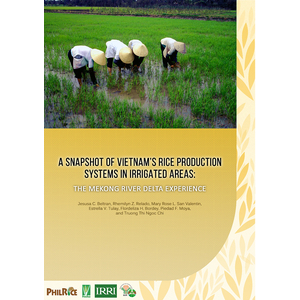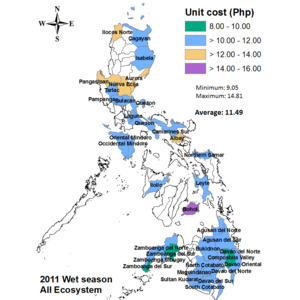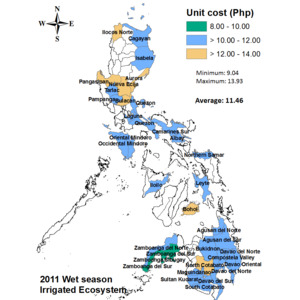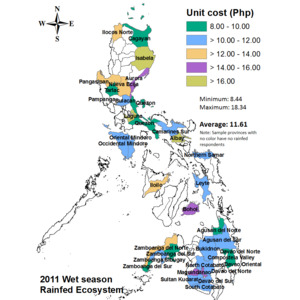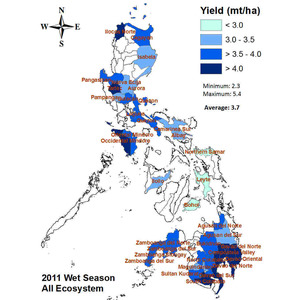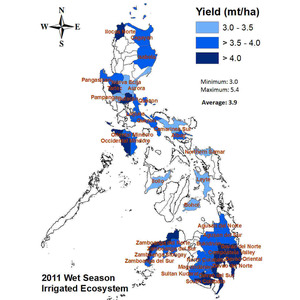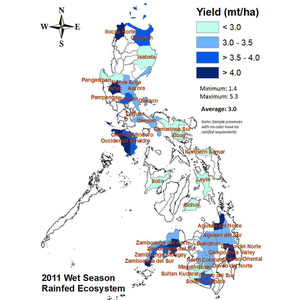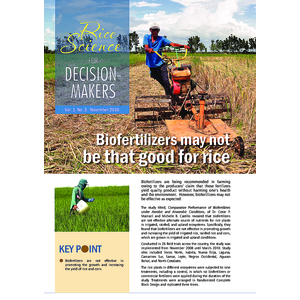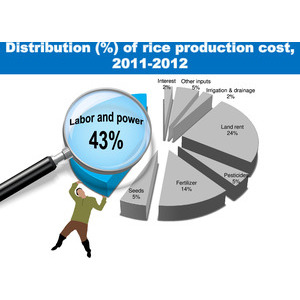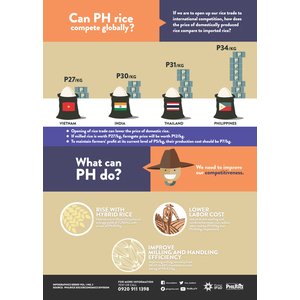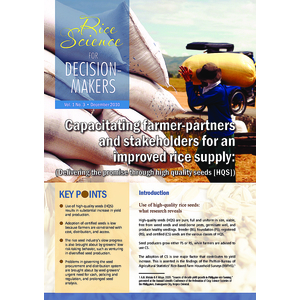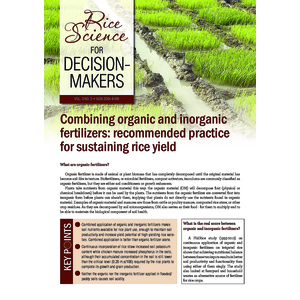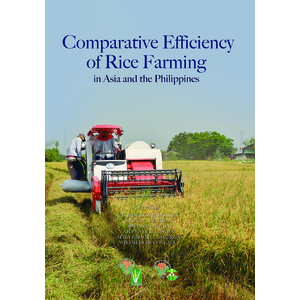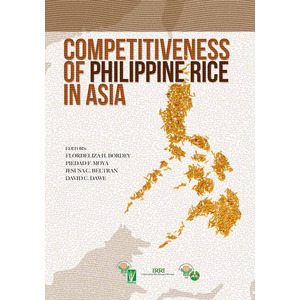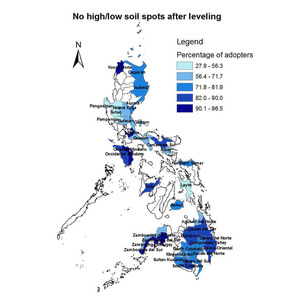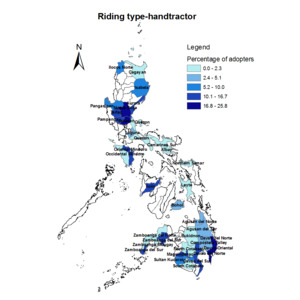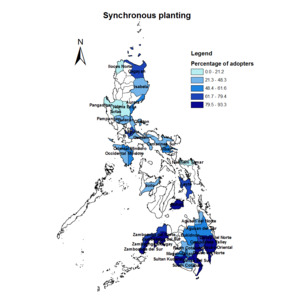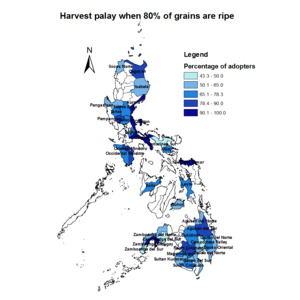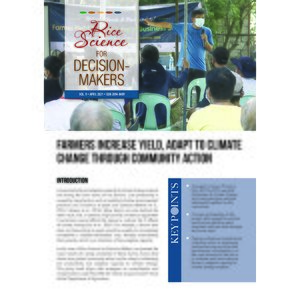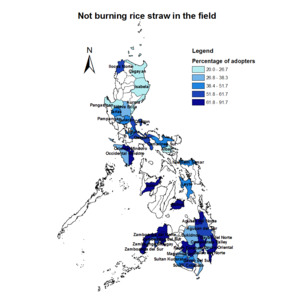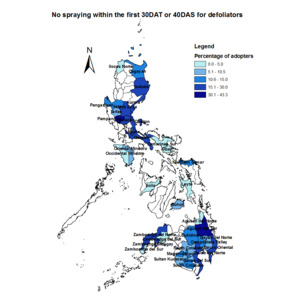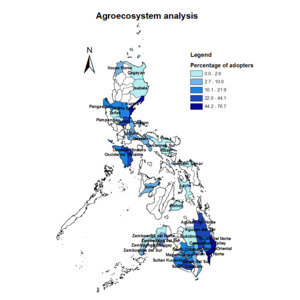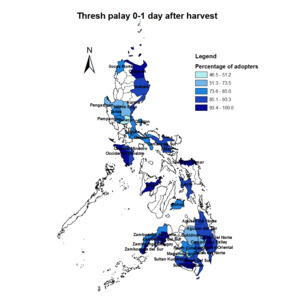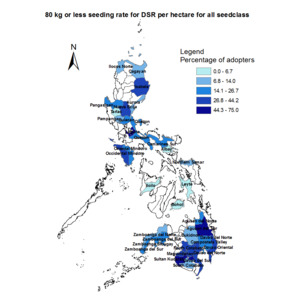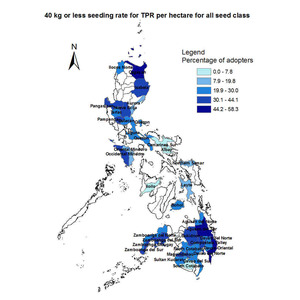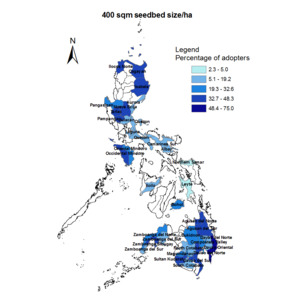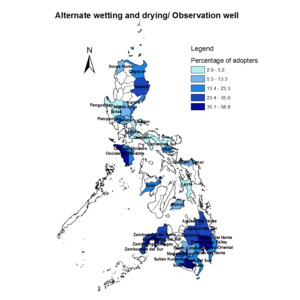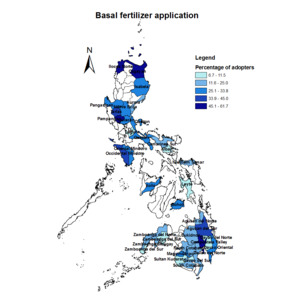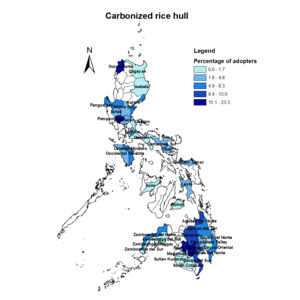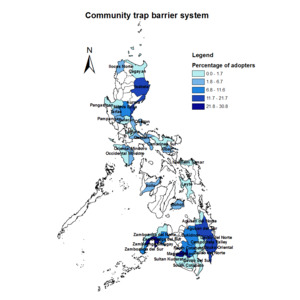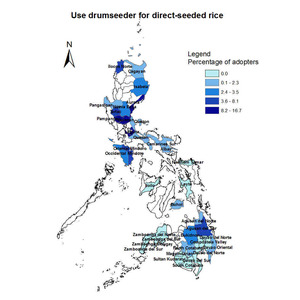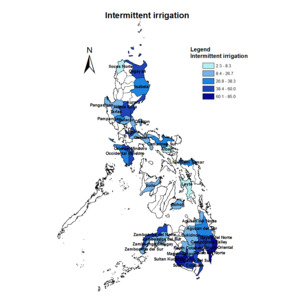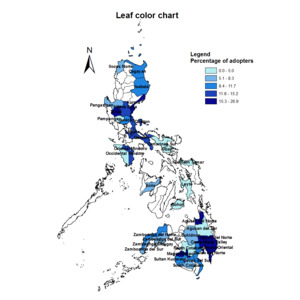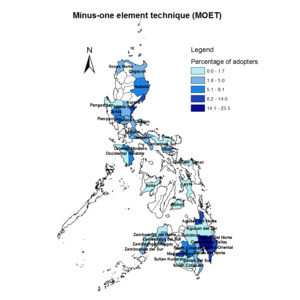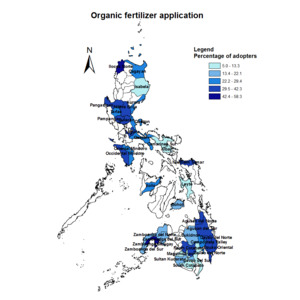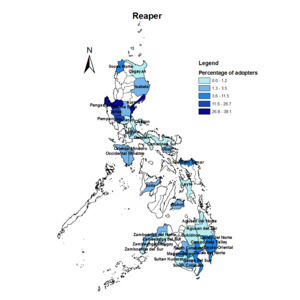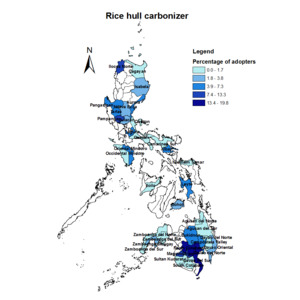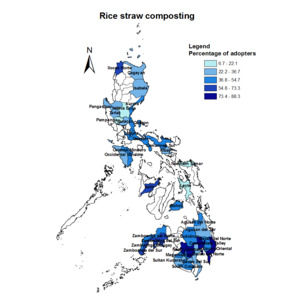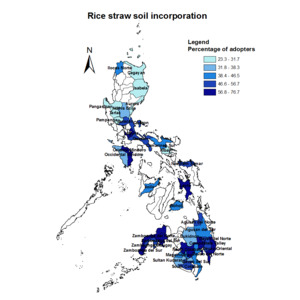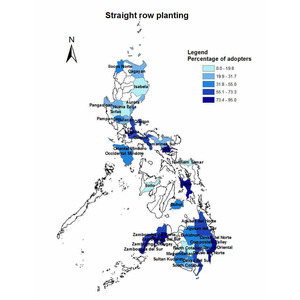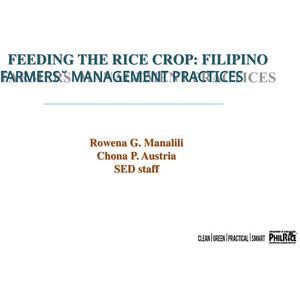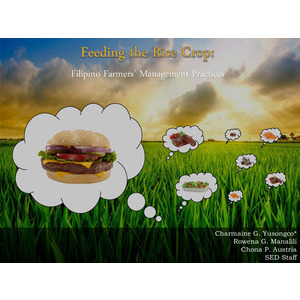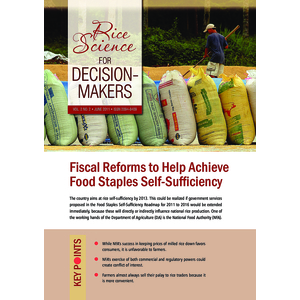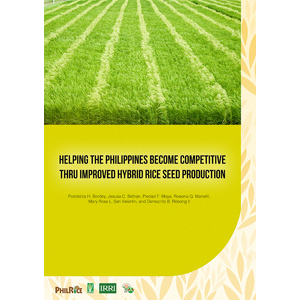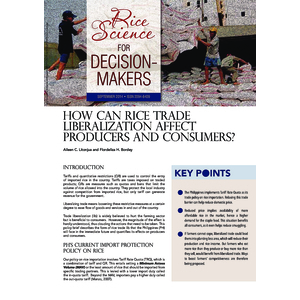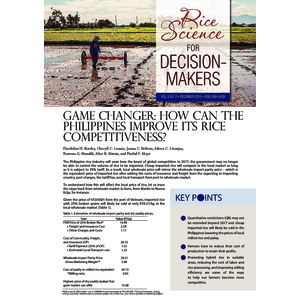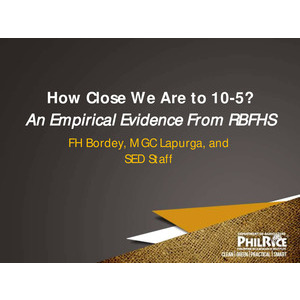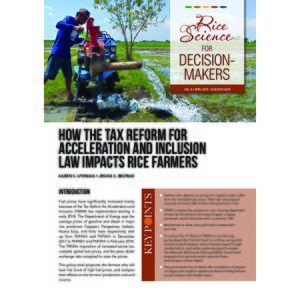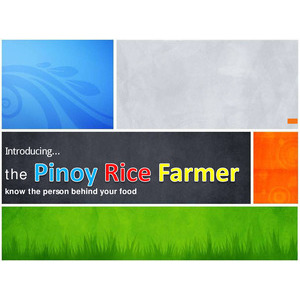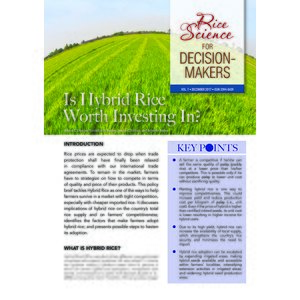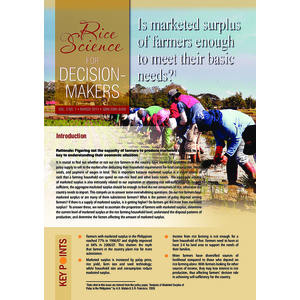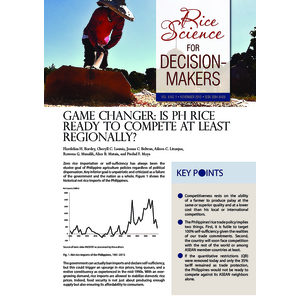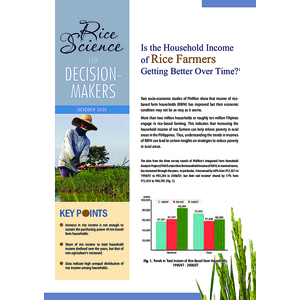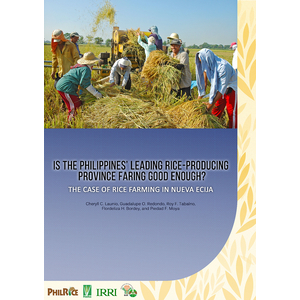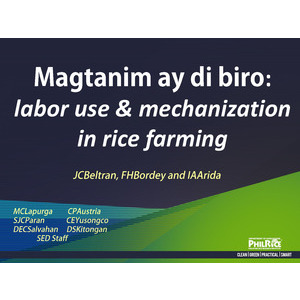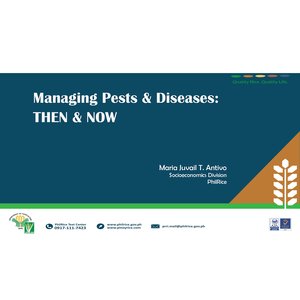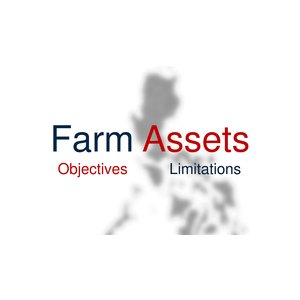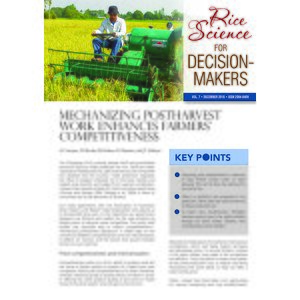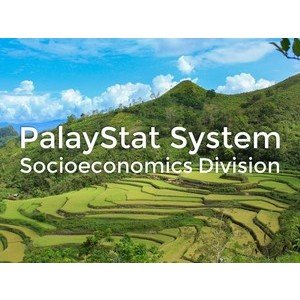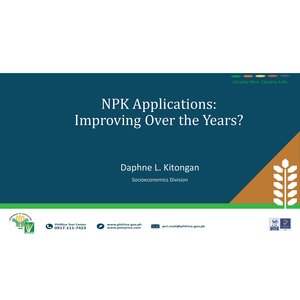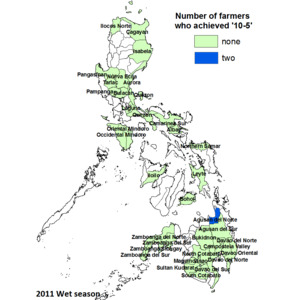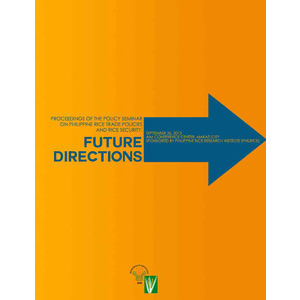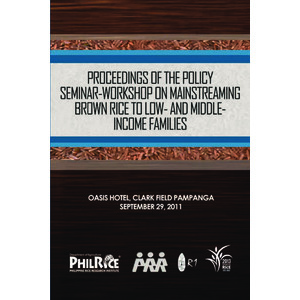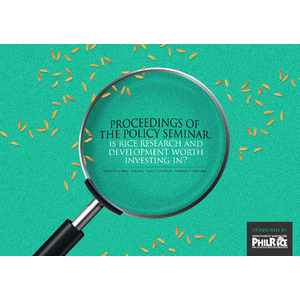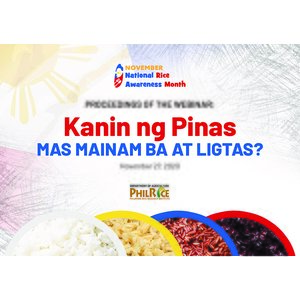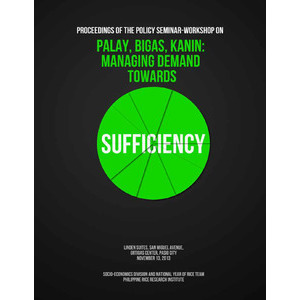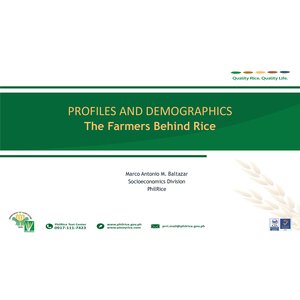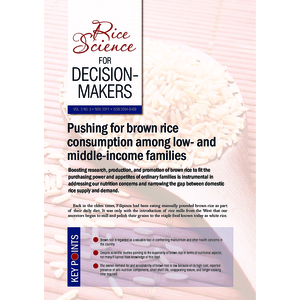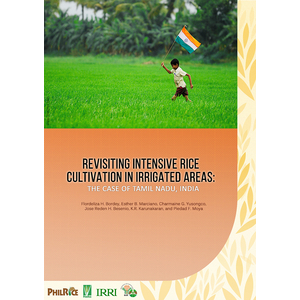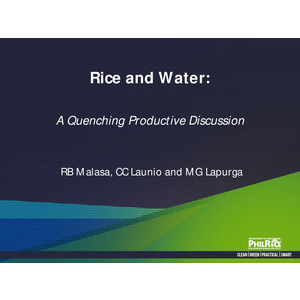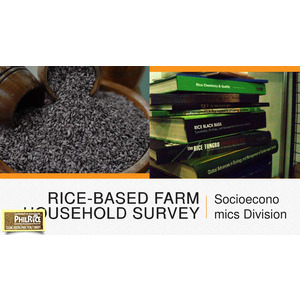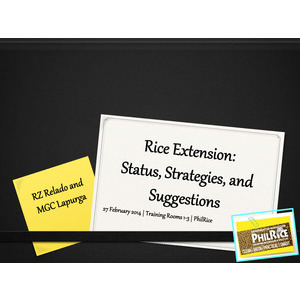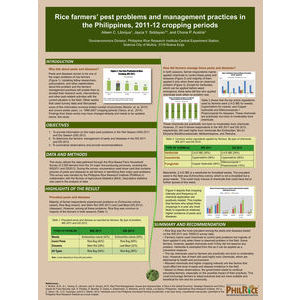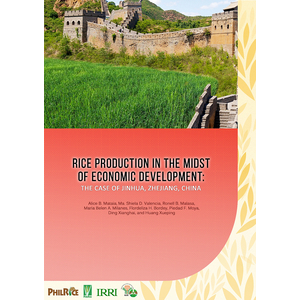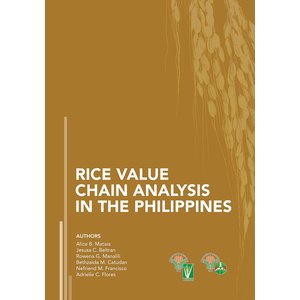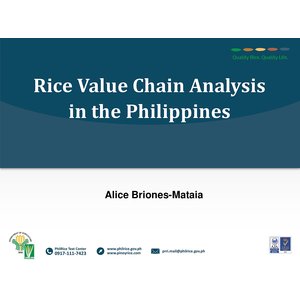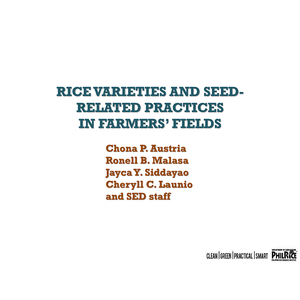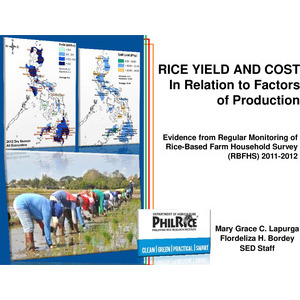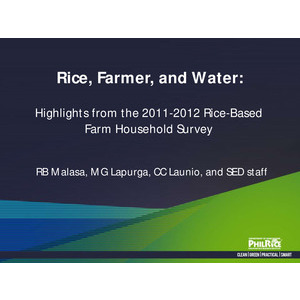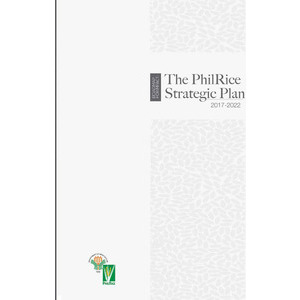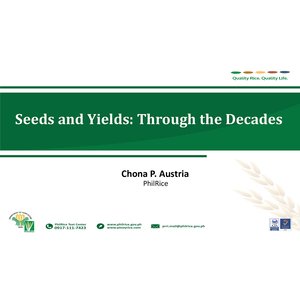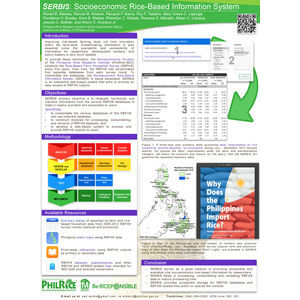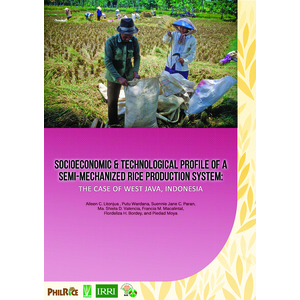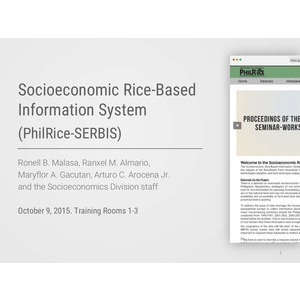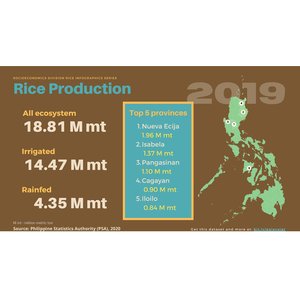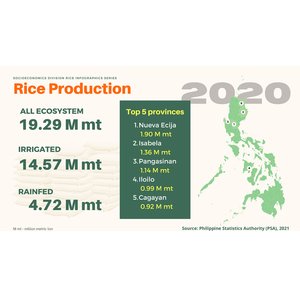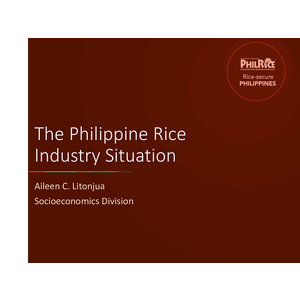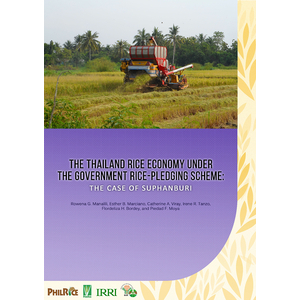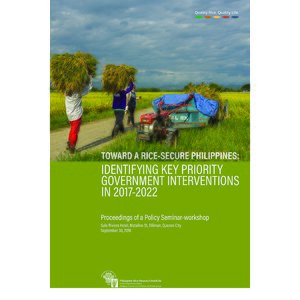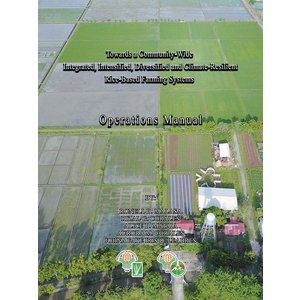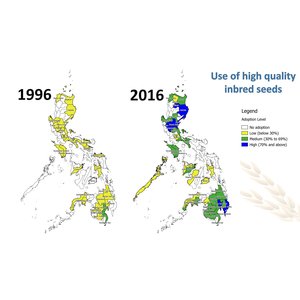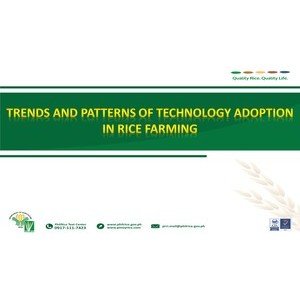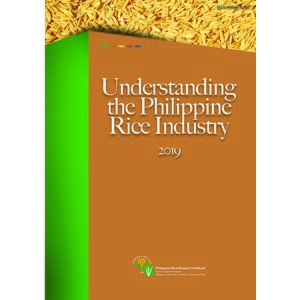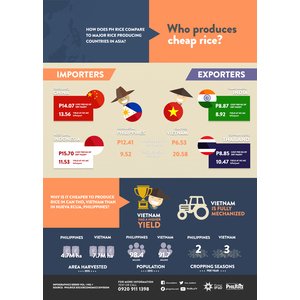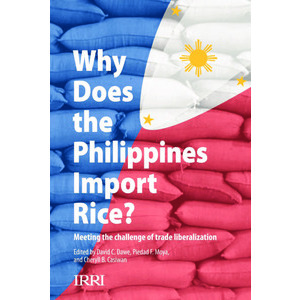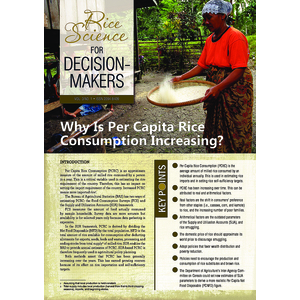Resources
A snapshot of Vietnam's rice production systems in irrigated areas: The Mekong River Delta experience
MonographsThis paper gives a profile of the rice production system in Can Tho province, which is within the Mekong River Delta in Vietnam. It discusses the current rice production system in irrigated areas with increased cropping intensity and higher adoption ...
View ResourceAverage production cost per kg (PHP/kg), all ecosystems, 2011 wet season
MapsPhilippine map that shows the 2011 RBFHS sample provinces' cost per kilogram in producing rice (both irrigated and rainfed farms)
View ResourceAverage production cost per kg (PHP/kg), irrigated ecosystem, 2011 wet season
Maps2011 data on cost per kilogram in producing rice in irrigated ecosystems overlayed in the Philippine map
View ResourceAverage production cost per kg (PHP/kg), rainfed ecosystem, 2011 wet season
Maps2011 data on cost per kilogram in producing rice in rainfed ecosystems overlayed in the Philippine map
View ResourceAverage yield per province (mt/ha), all ecosystems, 2011 wet season
Maps2011 RBFHS sample provinces' Philippine map with average yield for both irrigated and rainfed rice fields
View ResourceAverage yield per province (mt/ha), irrigated ecosystem, 2011 wet season
MapsIrrigated rice ecosystems produced yield (average) on RBFHS sample provinces of the 2011 survey round
View ResourceAverage yield per province (mt/ha), rainfed ecosystem, 2011 wet season
MapsRainfed rice ecosystems produced yield (average) on RBFHS covered provinces of the 2011 survey round
View ResourceBiofertilizers may not be that good for rice: Rice Science for Decision-Makers
Policy BriefersBiofertilizers are being recommended in farming owing to the producers’ claim that these fertilizers yield quality product without harming one’s health and the environment. However, biofertilizers may not be effectiv...
View ResourceBy hand or machine: 2011 & 2012 Labor & power use in rice production, RBFHS 2011-2012
PresentationsVisuals for the presentation of the 2011-2012 RBFHS results on the aspect of labor and power use in rice farming during the 2015 SED Seminar Series
View ResourceCan Philippine Rice Compete Globally?
InfographicsThis infographic summarizes the comparison of prices international players in the rice trade and what steps can be made to reduce the Philippine rice price in order to compete globally.
View ResourceCapacitating farmer-partners and stakeholders for an improved rice supply: Rice Science for Decision-Makers
Policy BriefersHigh-quality seeds (HQS) are pure, full and uniform in size, viable, free from weed seeds and seed-borne pests, germinate well, and produce healthy seedlings. Breeder (BS), foundation (FS), registered (RS), and certified (CS) seeds are the various cl...
View ResourceCombining organic and inorganic fertilizers: recommended practice for sustaining rice yield: Rice Science for Decision-Makers
Policy BriefersA PhilRice study (1993-2012) on continuous application of organic and inorganic fertilizers on irrigated rice shows that achieving nutritional balance between these two inputs results in better soil productivity and functionality than using either of...
View ResourceComparative efficiency of rice farming in Asia and the Philippines
BooksThis book on the comparative efficiency of rice farming in Asia and the Philippines is intended for a general audience who would like to learn about the current status of efficiency of rice farming in the Philippines relative to the five major rice p...
View ResourceCompetitiveness of Philippine Rice in Asia
BooksThis book provides the proper perspective on how the country can further improve its competitiveness in rice production and marketing in view of the full integration to the ASEAN Economic Community.
View ResourceFarmers achieving no high/low soil spots after leveling, 2011 wet season
MapsAdoption rate on the recommendation or practice on achieving no high or low spots after leveling during land preparation based on 2011 data
View ResourceFarmers adopting riding type-handtractors, 2011 wet season
MapsTechnology adoption of farmers using the riding-type handtractors from the 2011 Rice-Based Farm Household Survey (RBFHS) results
View ResourceFarmers adopting synchronous planting, 2011 wet season
Maps2011 RBFHS farmer-respondents rate of adoption on the recommended technology or practice on synchronous planting
View ResourceFarmers harvesting palay when 80% of grains are ripe, 2011 wet season
MapsHighlights the percentage of farmer-adopters that harvests palay when 80% of them are ripe, 2011 wet season survey results
View ResourceFarmers increase yield, adapt to climate change through community action: Rice Science for Decision-Makers
Policy BriefersThis current issue shows empirical evidence on the advantages of community action in increasing yield and enhancing farmers' adaptive capacity to climate change impacts.
View ResourceFarmers not burning rice straw in the field, 2011 wet season
MapsMap of the 2011 RBFHS results on the distribution of rice farmers that doesn't burn rice straw after harvest
View ResourceFarmers not spraying within the first 30DAT or 40DAS for defoliators, 2011 wet season
MapsExplores the rice farmers (%) who adopted the recommendation to not spray pesticides within the first 30 DAT or 40 DAS, 2011 cropping season
View ResourceFarmers practicing agroecosystem analysis, 2011 wet season
MapsMap on the distribution of rice adopters of AESA or Agroecosystem Analysis from the 2011 RBFHS results
View ResourceFarmers threshing palay 0-1 day after harvesting, 2011 wet season
MapsPercentage of rice-farmers adopters of the recommendation of threshing palay 0-1 day after threshing (2011)
View ResourceFarmers using 40 kg or less seeding rate for TPR per hectare for all seed class, 2011 wet season
MapsAdoption rate on the recommended practice on
View ResourceFarmers using 400 sqm seedbed size/ha, 2011 wet season
Maps400 sq.m. seedbed recommended practice adoption rate on rice farmers during the 2011 PhilRice-SED led rice household survey
View ResourceFarmers using 80 kg or less seeding rate for DSR per hectare for all seed class, 2011 wet season
MapsExplores the percentage of rice farmers that adopted the PhilRice's recommendation on 80 kg or less seeding rate per hectare (DSR)
View ResourceFarmers using alternate wetting and drying/observation well, 2011 wet season
MapsDistribution of rice farmer-adopters on the Alternate Wetting and Drying (AWD) and/or the observation well during the 2011 RBFHS round
View ResourceFarmers using basal fertilizer application, 2011 wet season
MapsFeatures the technology adoption rate of rice farmers regarding the basal fertilizer application, 2011
View ResourceFarmers using carbonized rice hull, 2011 wet season
MapsMap usage or adoption of rice farmers to the carbonized rice hull as fertilizer, by percentage, 2011 wet season
View ResourceFarmers using community trap barrier system, 2011 wet season
MapsRice farmers adoption rate on the community trap barrier system or CTBS from the 2011 survey round results
View ResourceFarmers using drumseeder for direct-seeded rice, 2011 wet season
MapsTechnology adoption rate of drumseeder for direct seeding of rice farmers of the 2011 cropping season
View ResourceFarmers using intermittent irrigation, 2011 wet season
MapsShows the technology adoption rate of Filipino rice farmers using recommended practice on water management using intermittent irrigation
View ResourceFarmers using leaf color chart, 2011 wet season
MapsLeaf color chart (LCC) adoption rate to rice farmers during the 2011 Rice-Based Farm Household Survey (RBFHS)
View ResourceFarmers using minus-one element technique (MOET), 2011 wet season
MapsIs Minus-One Element Technique or MOET being adopted by rice farmers? See this map for the farmer's adoption rate of MOET.
View ResourceFarmers using organic fertilizer application, all ecosystems, 2011 wet season
MapsOrganic fertilizer application adoption rate (percentage) of rice farmers from the 2011 RBFHS survey round
View ResourceFarmers using reaper, 2011 wet season
MapsThis map shows the technology adoption rate of reaper among rice farmers, by provinces, from 2011 wet season survey
View ResourceFarmers using rice hull carbonizer, 2011 wet season
MapsRice hull carbonizer or RCH rate of adoption among rice farmer-respondents from the RBFHS 2011 cropping season
View ResourceFarmers using rice straw composting, 2011 wet season
MapsMap generated using the 2011 RBFHS wet season results which features the adoption rate of the rice straw composting
View ResourceFarmers using rice straw soil incorporation, 2011 wet season
MapsOverview on the rice farmers adoption rate on the practicing rice straw soil incorporation as a rice straw waste management method
View ResourceFarmers using straight row planting, 2011 wet season
MapsThis map showcases the percentage of straight-row planting adopters for rice farming from the 2011 RBFHS results
View ResourceFeeding the Rice Crop: Filipino Farmers' Management Practices, RBFHS 2011
PresentationsShows the levels of fertilizer use and management of 2011 RBFHS farmers in rice production; Presented during the 2014 SED Seminar Series
View ResourceFeeding the Rice Crop: Filipino Farmers' Management Practices, RBFHS 2011-2012
Presentations2015 SED Seminar Series presentation about 2011 and 2012 RBFHS results on frequency and timing of fertilizer application, and common fertilizer grades
View ResourceFiscal reforms to help achieve food staples self-sufficiency: Rice Science for Decision-Makers
Policy BriefersThe country aims at rice self-sufficiency by 2013. This could be realized if government services proposed in the Food Staples Self-Sufficiency Roadmap for 2011 to 2016 would be extended immediately, because these will directly or indirectly influence...
View ResourceHelping the Philippines become competitive thru improved hybrid rice seed production
MonographsThis paper assesses the farm-level competitiveness of producing F1 seeds in the Philippines relative to China and India, the world’s major hybrid seed producers. Specifically, yield and input-use in hybrid rice seed production were e...
View ResourceHow can rice trade liberalization affect producers and consumers?: Rice Science for Decision-Makers
Policy BriefersTrade liberalization (lib) is widely believed to hurt the farming sector but is beneficial to consumers. However, the magnitude of the effect is hardly understood, thus clouding the actions that need to be taken. This policy brief describes the form ...
View ResourceHow can the Philippines improve its rice competitiveness?: Rice Science for Decision-Makers
Policy BriefersThe Philippine rice industry will soon bear the brunt of global competition. In 2017, the government may no longer be able to control the volume of rice to be imported. Cheap imported rice will compete in the local market as long as it is subject to ...
View ResourceHow Close We Are to 10-5? An Empirical Evidence From RBFHS, RBFHS 2011
PresentationsThis 2014 SED seminar tackles 4 main points on rice production: yield and relation to production factors, social characteristics, costs and returns, and spatial distribution of yield and unit cost.
View ResourceHow the Tax Reform for Acceleration and Inclusion Law Impacts Rice Farmers?
Policy BriefersThis policy brief pinpoints the farmers who will bear the brunt of high fuel prices, and analyzes their effects on the farmers’ production cost and income.
View ResourceIntroducing the Pinoy Rice Farmer: Know the Person behind your Food, RBFHS 2011-2012
PresentationsExplores the basic characteristics, training background, and quality of life of the Filipino rice farmers in this 2014 SED Seminar Series presentation
View ResourceIs hybrid rice worth investing in?: Rice Science for Decision-Makers
Policy BriefersThis policy brief tackles Hybrid Rice as one of the ways to help farmers survive in a market with tight competition, especially with cheaper imported rice.
View ResourceIs marketed surplus of farmers enough to meet their basic needs?: Rice Science for Decision-Makers
Policy BriefersIt is crucial to find out whether or not our rice farmers in the country have marketed surplus or the excess palay supply to sell to the market after deducting their household requirements for food consumption, feeds, seeds, and payment of wages in k...
View ResourceIs PH rice ready to compete at least regionally?: Rice Science for Decision-Makers
Policy BriefersThe government can actually ban imports and declare self-sufficiency, but this could trigger an upsurge in rice prices, long queues, and a restive constituency as experienced in the mid-1990s. With an ever-growing demand, rice imports are allowed to ...
View ResourceIs the household income of rice farmers getting better over time?: Rice Science for Decision-Makers
Policy BriefersTwo socio-economic studies of PhilRice show that income of rice-based farm households (RBFH) has improved but their economic condition may not be as rosy as it seems. More than two million households or roughly ten million Filipinos engage in rice-ba...
View ResourceIs the Philippines' leading rice-producing province faring good enough? The case of rice farming in Nueva Ecija
MonographsAchieving “zero rice import†remains the single most sought-after target in Philippine agriculture, irrespective of any political administration. This resolve is strengthened each time a major rice crisis hits the world o...
View ResourceMagtanim ay di biro: labor use & mechanization in rice farming, RBFHS 2011
PresentationsRBFHS 2011 presentation on labor components (labor use, labor and power cost and level of mechanization) at the 2015 Seminar Series
View ResourceManaging Pests and Diseases: Then and Now, RBFHS 2016
PresentationsThis presentation answers the questions: What are farmers’ major pest problems then and now? and How do farmers managed these pest problems? using the cross-section data of PhilRice's Rice-based Farm Household Survey covering 2011 we...
View ResourceMapping Farm Assets and Machine-Use, RBFHS 2016
PresentationsPresented during the 31st National Rice R4D Conference on September 6-7, 2018 that describes the changes in the proportion of farmers with farm assets using the longitudinal data (1996-2016) of RBFHS
View ResourceMechanizing postharvest work enhances farmers competitiveness: Rice Science for Decision-Makers
Policy BriefersThe theme for this issue highlights the significance of mechanizing postharvest operations to improve farmers' competitiveness. To be competitive is to be able to reduce cost while maintaining the same yields so they can offer a lower selling price.
View ResourceNew and Improved PalayStat: Your One-Stop Shop for Rice Data Needs
PresentationsThis presentation was presented in the 48th CSSP Scientific Conference last July 2-7, 2018 highlighting the new features, databases and publications integrated in the PalayStat System.
View ResourceNPK Applications: Improving Over the Years, RBFHS 2016
PresentationsThis study describes the trends in fertilizer use and management practices using Rice-Based Farm Household Survey conducted every five years.
View ResourceNumber of farmers who achieved '10-5' (10mt/ha-PHP/kg), 2011 wet season
MapsMap based on the 2011 RBFHS results that shows the number of farmers with P5/kg production cost and has 10mt/ha and above harvest
View ResourceProceedings of the Policy Seminar on Philippine Rice Trade Policies and Rice Security: Future Directions
ProceedingsThis book was published to serve as a reference material on Philippine rice trade policies, its impact, and its future direction.
View ResourceProceedings of the Policy Seminar-Workshop on Mainstreaming Brown Rice to Low- And Middle-Income Families
ProceedingsThese proceedings document the presentations and discussions during the Policy Seminar-Workshop on Mainstreaming Brown Rice to Low-And Middle-Income Families last September 29, 2011.
View ResourceProceedings of the Policy Seminar: Is Rice Research and Development Worth Investing In?
ProceedingsThis publication documents the discussions regarding status of rice utilization during the policy seminar: Is Rice Research and Development Worth Investing In?
View ResourceProceedings of the Webinar: Kanin ng Pinas, Mas Mainam ba at Ligtas?
ProceedingsThis proceeding documents the discussions on the Proceedings of the Webinar: Kanin ng Pinas, Mas Mainam ba at Ligtas? last November 2020.
View ResourceProceedings on palay, bigas, kanin: Managing demand towards sufficiency
ProceedingsThis publication documents the discussions on the Policy Seminar-Workshop on Palay, Bigas, Kanin: Managing Demand Toward Sufficiency last November 2013.
View ResourceProfiles and Demographics: The Farmers Behind Rice, RBFHS 2016
PresentationsThis presentation explores the profile of the Filipino rice farmers, its socio-demographics characteristics, and their social, cultural, financial, and political situation.
View ResourcePushing for brown rice consumption among low- and middle-income families: Rice Science for Decision-Makers
Policy BriefersBoosting research, production, and promotion of brown rice to fit the purchasing power and appetites of ordinary families is instrumental in addressing our nutrition concerns and narrowing the gap between domestic rice supply and demand.
View ResourceRevisiting intensive rice cultivation in irrigated areas: the case of Tamil Nadu, India
MonographsThis paper describes the rice production system in intensively cultivated and irrigated areas in Tamil Nadu, India, 15 years after the implementation of a project on reversing declining trends in productivity. Current production and marketing practic...
View ResourceRice and Water: A Quenching Productive Discussion, RBFHS 2011
PresentationsA 2014 Seminar Series presentation that emphasized water as a vital resource in rice production and covers the ff: information about water use and farmer's sources of water.
View ResourceRice Based Farm Household Survey Background, Socioeconomics Division
PresentationsA short overview in the history, methodology and sampling procedure of the Rice-Based Farm Household Survey (RBFHS)
View ResourceRice Extension: Status, Strategies, and Suggestions, RBFHS 2011
PresentationsTackles the 2011 RBFHS results on technology awareness and adaption, source in information and awareness of rice farming issues; Presented during the 2014 SED Seminar Series
View ResourceRice farmers' pest problems and management practices in the Philippines
PostersThis poster is presented during 2015 Pest Management Council of the Philippines Conference that showcases the farmer's common pests and disease and their common management methods on these problems.
View ResourceRice production in the midst of economic development: The case of Jinhua, Zhejiang, China
MonographsThis report assesses the performance of rice production in intensely cultivated irrigated areas in Zhejiang, China, under a rapidly growing economy. In particular, farmers’ rice production management and marketing practices were dete...
View ResourceRice Value Chain Analysis in the Philippines
BooksThis book presents the results of the Rice Value Chain Analysis in the Philippines study, a study funded by Department of Agriculture-National Rice Program, through the Bureau of Agricultural Research, that analyzes the rice value chain in the top 20...
View ResourceRice Value Chain Analysis in the Philippines
PresentationsThis presentation summarizes the findings of the Rice Value Chain Analysis in the Philippines study, a study funded by Department of Agriculture-National Rice Program, through the Bureau of Agricultural Research, that analyzes the rice value chain in...
View ResourceRice Varieties and Seed-Related Practices in Farmers' Fields, RBFHS 2011-2012
PresentationsProvides updates of adoption of selected seed- and crop establishment-related practices, and technologies, presented during the 2015 Seminar Series
View ResourceRice Yield and Cost: In Relation to Factors of Production, RBFHS 2011-2012
PresentationsDiscusses in detail in this 2014 SED Seminar Series presentation the factors affecting rice production, present cost and returns of rice production and variations across provinces and seasons
View ResourceRice, Farmer, and Water: Highlights from the 2011-2012 Rice-Based Farm Household Survey
PresentationsThis presentation will provide additional information between farmers and farming in by their source of water (part of the 2015 seminar series)
View ResourceRoadmap for Impact: The PhilRice Strategic Plan 2017-2022
BooksThe Strategic Plan for 2017-2022 showcase proposed and planned strategies on how to create significant impacts on the lives of all our rice stakeholders.
View ResourceSeeds and Yields: Through the Decades, RBFHS 2016
PresentationsUsing the Rice-Based Farm Household Survey conducted every five year, this study describes the trends in adoption of high-quality seeds, commonly planted rice varieties, reasons for planting, and constraints to adoption.
View ResourceSERBIS: Socioeconomic Rice-based Information System
PostersPalayStat, formerly named SERBIS, was presented as a poster during the 28th National Rice Research and Development Conference last September 2015
View ResourceSocioeconomic and technological profile of a semi-mechanized rice production system: The case of West Java, Indonesia
MonographsThis paper updates information on rice farming in intensively cultivated and irrigated areas in West Java, Indonesia. Specifically, the project aims to describe farmers’ socioeconomic characteristics; assess current yield and quantit...
View ResourceSocioeconomic Rice-Based Information System (PhilRIce-SERBIS)
PresentationsIntroduction and presentation of the PalayStat System, formerly SERBIS, during the 2015 SED Seminar Series
View ResourceSocioeconomics Division Rice Infographics Series - 001 - Rice Production
InfographicsThis infographic explores 2019 data on rice production, area harvested and yield with the top performing provinces per category.
View ResourceSocioeconomics Division Rice Infographics Series - 002 - Rice Production (2020)
InfographicsUpdated 2020 infographic on the estimated rice production, area harvested, and yield and its top 10 performers.
View ResourceThe Philippine rice industry situation 2018
PresentationsThis presentation summarizes the current situation of the Philippine rice industry in terms of production, yield, importation, competitiveness and marketing.
View ResourceThe Thailand rice economy under the government rice-pledging scheme: the Case of Suphanburi
Monographs"This paper describes the status of rice production in intensively cultivated, irrigated areas of SuphanBuri, Thailand, under the government’s rice-pledging scheme. Production practices, input use, yield, and partial factor productiv...
View ResourceToward a Rice-Secure Philippines: Identifying Key Priority Government Interventions in 2017-2022 (Proceedings of a Policy Seminar-Workshop)
ProceedingsThese proceedings document the presentations, discussions, and pieces of advice that transpired during the seminar-workshop titled Toward a Rice-Secure Philippines: Identifying Key Priority Government Interventions for 2017-2022 conducted by the Phil...
View ResourceTowards a Community-Wide IIDCR Rice-Based Farming System: Operations Manual
ManualsPalayamanan, a rice-based farming systems approach, was identified as one of the strategies to address income and food security issues hence, uplifting rice farming households and communities from poverty. However, implementing a national rice-based ...
View ResourceTrends and Patterns of Technology Adoption (Supplementary Maps), RBFHS 2016
PresentationsSupplementary maps to the presentation of Trends and Patterns of Technology Adoption presented on the 31st National Rice R4D Conference last September 6-7, 2018
View ResourceTrends and Patterns of Technology Adoption in Rice Farming, RBFHS 2016
PresentationsThis study describes the trends in awareness and adoption of the introduced and recommended technologies and farming experiences.
View ResourceUnderstanding the Philippine Rice Industry (2019)
BooksThis booklet updates the 2011 Philippine rice industry primer, a PhilRice publication that helped researchers understand the trends and current status of the rice sector, with additional data and information about major issues in the recent past. It ...
View ResourceWho Produces Cheap Rice?
InfographicsWho Produces Cheap Rice? provides an overview to the major importers and exports in the Southeast Asia with its corresponding details on cost, price, yield and other factors in their rice industry.
View ResourceWhy does the Philippines import rice?
Books"This book explores the answers to the perpetual question on the minds of many Filipinos is ""Why do we import rice?""."
View ResourceWhy is per capita rice consumption increasing?: Rice Science for Decision-Makers
Policy BriefersPer Capita Rice Consumption (PCRC) is an approximate measure of the amount of milled rice consumed by a person in a year. This is a critical variable used in estimating the rice requirement of the country. Therefore, this has an impact on setting the...
View Resource